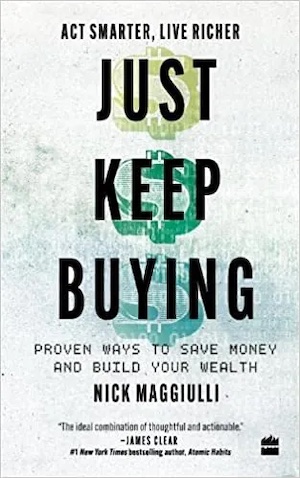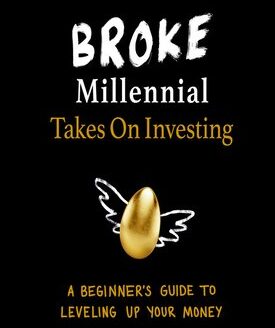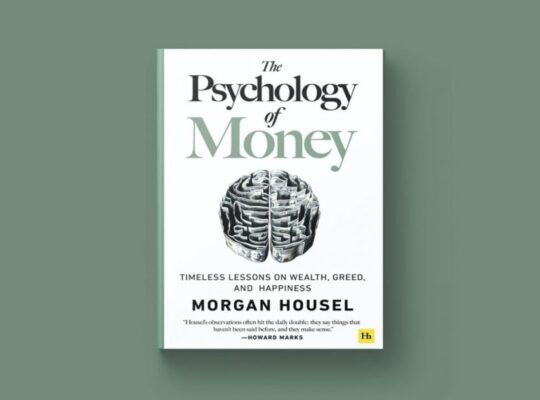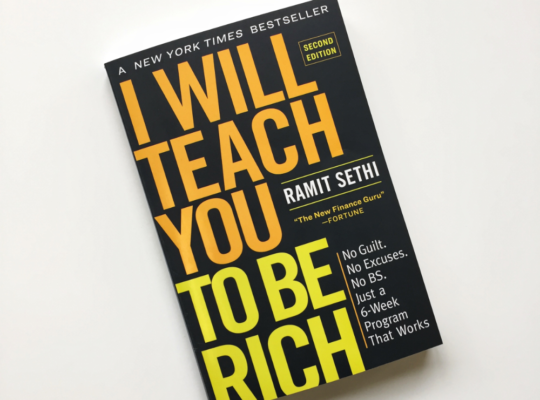
‘Just Keep Buying’, published in 2022 is a straightforward approach to personal finance that revels in debunking falsehoods and eliminating old cliches about money and personal finance. It delves into the psychology of money and presents a practical guide to making healthy financial decisions, including all-important subjects such as saving and making investments.
The author, ‘Nick Maggiulli’ is the chief operations officer and data scientist of Ritholtz Wealth Management. He also writes the popular blog ‘Dollars and Data’, which offers an information-driven approach to personal finance. Maggiulli has written about money for various financial publications.
This book will teach us how to make money work for us.
When it pertains to money, there is a lot of poor advice readily available. The problem with all that lousy advice is that it not only fails to help you control your finances; it is also a cause of regret, tension, and stress. The author believes that financial decisions are often context-dependent.
Credit card debt, for example, may be a valuable resource for certain people. In other circumstances, relatively insignificant costs, such as purchasing a daily cup of coffee, might be an unneeded expenditure. These spending decisions, however, can lead to a more meaningful existence or fulfilment in one’s life. Saving is the same way. The amount of money you should save is determined by your income.
Save more when you’re earning more:
The author compares saving to the Southern Alaska fish known as ‘Dolly Varden charr’. Until the early summertime, these Pacific rivers are devoid of life. That’s when the salmon come. Charr eat these salmon eggs, resulting in a months-long feasting spree. But eventually the salmon go after the summertime. The rivers have turned into a place without food once more. Despite this, the charr had the ability to endure the harsh environmental conditions.
The species’ capacity to adjust its bodily shape to its surroundings is the explanation behind this. When there isn’t enough food, Dolly Varden charr compress their digestive organs and reduce their rate of metabolism. When the salmon fish come, those organs double in dimension and their metabolic process resumes.
In a similar manner, changing your behaviour to your surroundings is an essential component to saving.
Not every individual has the same saving capacity. Income, as experts point out, is the most important predictor of savings. People in the bottom 20% of income makers generally save only 1% of their earnings. However, this figure jumps to 25% for the top 20%. The notion that every individual should save X percent is incorrect since not everyone is capable of doing so.

Earning less while you’re young and more when you’re older is common. Some occupations need you to reside in expensive cities, while others do not. Then there are the ups and downs in life, with their financial ramifications – weddings, divorces, children education, promotions and layoffs, Diwali bonuses, illnesses, and so on. It’s an impractical endeavor to try to establish a single, clean rule that encompasses so much complex actuality.
This leads us again to our Dolly Varden charr, who adjust their calorie consumption according to the amount of food accessible. So, the basic saving idea is to save what you can, when you can. In reality, this means saving more when you earn more and saving less when you earn less.
Set a realistic savings goal:
Money is not bound by moral laws. It’s a logical equation. And it states unequivocally that you cannot save what you do not have. So, first and foremost things is that – you must grasp where you stand financially and what you can preserve at this point. This will necessitate a deeper examination of your finances.
In other words, savings equals income minus expenditure.
In this equation, income is the amount shown on your pay slip. However, the spending aspect is a little more difficult. The conventional wisdom is to maintain a record of every penny you spend. Fixed costs, such as rent, loan payments and monthly utility expenses are predictable and do not change much. However, keeping an eye on variable spending is more difficult. So, to make things easier, calculate your fixed expenditures and calculate the remainder by rounding them out to the nearest amount. Take grocery shopping. You know how frequently you buy things and how much you spend each week, so figure it out.
Apply this to all of your costs. Include all variable costs such as food, coffee, drinks, snacks, fuel, metro train tickets, movies, your hobbies and so on. Add these costs to the above calculation. The residual amount is the one that you can save.

The standard thumb rule is that you’ll need 25 times your yearly income to retire, which is where the majority of your savings are going. However, how that appears in practice is determined by your lifestyle. If you’re used to frequent overseas travel and a bustling social circle in a wealthy location with high cost of living, you’re unlikely to have a desire to give such things up. That means you’ll require more funds than somebody who doesn’t do or have such things.
If you believe that this retirement corpus will not suffice, the simple logical solution is “to increase your income”.
Just continue to invest:
The reason you can’t save yourselves to become wealthy is simple: saving has limitations that are rigid. Then why not think about increasing your income?
In most circumstances, increasing your income is the best option. “But How?”, will be the next question. “Just Keep Buying” is the answer to this question, and that is the title of this book as well.
A single precise piece of data may at times assist us understand a complicated system.
Warren Buffett summarizes this one particular piece of information as follows: most stock markets rise most of the time. He has a valid argument. The twentieth century saw two world wars, the Great Depression, a dozen recessions, Global Oil awe and a flu outbreak. However, the global stock market, which measures the value of equities, has soared. So, in the author’s opinion, the only financial guidance worth pursuing is to simply keep purchasing stocks. Over decades, it is far more difficult to lose than it is to win.

Even historically sluggish markets, such as the Japanese stock market, favor this mindset. Japanese stocks peaked in 1989 and have yet to return to that peak. If you had made a one-time investment of Rs. 10,000 back then in 1989, you would now have Rs. 6,900. However, if you had invested Rs. 10,000 per year from 1989 to 2022, your Rs. 3,30,000 investment would have increased to Rs. 5,90,000. That’s not a tremendous return, but it’s better than letting inflation take away your cash holdings.
Certainly, you need not commit to a particular market. The majority of the world’s markets rise. What you actually want to do is diversify your investments, such as by purchasing an index of worldwide firms that operate in several areas. This is not an investing advice, but it’s worth recalling that the market price line has historically trended upwards. Link your savings to that line, and your income will increase over time.
Debt is not simple – its complex:
Debt, according to conventional wisdom, is bad. The Bible itself cautions that “the borrower is a slave to the lender”. But it’s not quite that straightforward. Indeed, debt may be somewhat contradictory.
For instance, consider credit cards. We are all aware that credit card interest rates are too high. Once you start excavating with that shovel, it’s simple to get yourself stuck in an untenable position that’s difficult to get out of. That is not inherently incorrect, but it is also not the entire story. Credit cards might be beneficial to low-income people. Economists refer to it as the credit card debt conundrum.
When you don’t have a lot of money, the future appears bleak: one drought, one run of poor luck, and you’re bankrupt. Your pay is insufficient to cover unexpected expenses. If your car breaks down on the way to work, you won’t have enough money to have it mended. You also know that your credit score isn’t fantastic, so getting a loan will be difficult. So, what are you going to do? Therefore you keep paying those exorbitant credit card debt interest rates in order to maintain your future access to finance. You will make every effort to safeguard your financial existence.
This demonstrates that debt is neither “good” nor “bad” – it is merely an instrument that may be used or misused. Everything boils down to circumstance. So, the true question is, does debt help you reach your goals?
Learn to enjoy your spending as well:
Humans are more prone to blindly trust the crowd or the subconscious underlying logic than reason. That implies we can’t truly discuss money in general. We must also consider its psychological influence and how it makes us feel.
According to a poll, the primary source of stress in people’s life is “anxiety about saving.” And it appears that this fear affects everyone, regardless of money or wealth they possess.

We are constantly inundated with financial advice that causes us to doubt ourselves. It claims that every rupee you spend has the potential to be saved, and if you truly assumed accountability, you would do just that. But you can’t save every single rupee, and attempting to do so does nothing but will drive us ill. The pressure of not saving enough surpasses the benefits of saving. Saving is only advantageous if it can be done without worry.
In summary, saving is vital, but so is quality of life. So, how do you find the correct balance – how do you look after your finances while still looking after your health? Concentrate on purchases that will provide you with the most long-term satisfaction. Take, for example, the coffee you get from the coffee shop daily, which is a complaint among several financial gurus. It may appear to be a silly purchase, yet one coffee may help you to perform at your peak at work. In that situation, you are improving your professional competence. That’s a genuinely satisfying long-term endeavour, therefore it’s money well spent.
Money is a tool that helps you to live the life you want. What’s really tough, therefore, isn’t spending it, but determining what you would like out of life. Making spending decisions will become easier and more fun once you understand this.
Conclusion:
The most significant takeaway from this book is:
How much should you be saving? Spending? Investing? Taking out a loan? – It all boils down to context. Does debt help you reach your life objectives, or is it just a temporary fix? Does spending make you happy? Only by delving into these questions will enable you to create an achievable financial strategy that works for you.





